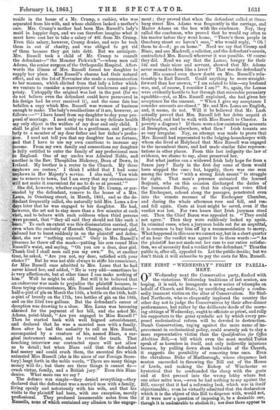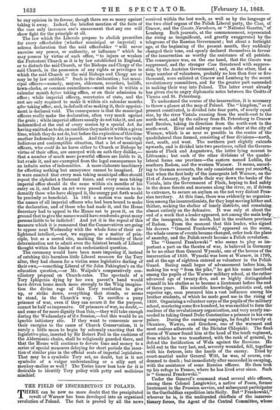THE FIRST " WEDNESDAY " FIGHT IN PARLIA- O N Wednesday
next the Conservative party, flushed with the victorious Wednesday traditions of last session, are hoping, it is said, to inaugurate a new series of triumphs on behalf of Church and State, by sacrificing solemnly a confes- sedly innocent victim on the altar of Conservatism. Sir Staf- ford Northcote' who so eloquently implored the country the other day not to judge the Conservatives by their after-dinner performances, but rather by the deliberate deeds of the morn- ing sittings of Wednesday, ought to officiate as priest, and rally his supporters to the great symbolic act by which every pro- posed ecclesiastical reform will be devoted to destruction. Dumb Conservatism, raging against the mere name of im- provement in ecclesiastical policy, could scarcely ask to slay a more representative victim than the Qualification for Office Abolition Bill,—a bill which even the most morbid Tories speak of as harmless in itself, and only indirectly injurious because, by pulling down sham bulwarks of the Church, it suggests the possibility of removing true ones. Even the chivalrous Duke of Marlborough, whose eloquence last session succeeded in throwing the Bill out of the House of Lords' and making the Bishop of Winchester so hysterical that he confounded the sheep with the goats and at first pressed into the wrong lobby where but one other mitre was,--even he had nothing to say against the Bill, except that it had a reformine° look, which was in itself objectionable; even he virtually admitted that the declaration which it is the object of this Bill to dispense with, would not, if it were now a question of imposing it, be a desirable one, though it is undesirable to abolish it; nor does there appear to be any opinion in its favour, though there are so many against taking it away. Indeed, the briefest mention of the facts of the case only increases one's amazement that any one will show fight for the principle at all. The law which the Liberals propose to abolish prescribes for every officeholder (whether municipal or imperial) a solemn declaration that the said officeholder "will never exercise any power, or authority, or influence" which he may possess by virtue of such office, "to injure or weaken the Protestant Church as it is by law established in England, or to disturb the said Church, or the Bishops and Clergy of the said Church, in the possession of any rights or privileges to which the said Church or the said Bishops and Clergy are or may be by law entitled." Such is the declaration; but muni- cipal officers—namely, mayors, aldermen, recorders, bailiffs, town-clerks, or common councilmen—must make it within a calendar month before taking office, or on their admission to office ; while imperial officer, secretaries of state, and the rest are only required to make it within six calendar months after taking office, and, in default of so making it, their appoint- ment is declared void. The consequence is that the municipal officers really make the declaration, often very much against the grain ; while imperial officers usually do not take it, and are indemnified at the end of every session by a special Act for having omitted so to do, on condition they make it within a given time, which they do not do, but before the expiration of this time another Indemnity Act is passed. And thus we have the truly ludicrous and contemptible situation, that a lot of municipal officers, who could do no harm either to Church or Bishops by virtue of their office, are annoyed with an oath they dislike,— that a number of much more powerful officers are liable to it, but evade it, and are exempted from the legal consequences by an infinite series of indemnities. A more elaborate machinery for effecting nothing but annoyance cannot be imagined. If it were enacted that every man taking municipal office should repeat the alphabet a thousand times, and every man taking imperial office should do the same within six months of his entry on it, and then an act were passed every session to in- demnify those who have skipped it, the energy put forth would be precisely as beneficial. In 1861 a motion was made for the names of all imperial officers who had been bound to make the declaration, and of those who had made it, and the Home Secretary had to appeal to the House not to press it, on the ground that to give the names would have rendered a great many persons liable to be indicted! And yet it is the repeal of this measure which it is rumoured that the Conservatives are going to oppose next Wednesday with the whole force of their en- lightened intellect,—not, we suppose, as a matter of prin- ciple, but as a sacred rite, marking the solemnity of their determination not to admit even the faintest breath of Liberal thought within the limits of an ecclesiastical question.
The ceremony would have been more imposing if, instead of catching this harmless little Liberal measure for the Tory altar, they had chosen for a victim some legislative darling of their own,—something Liberal of Sir John Pakington's on the education question,—or Mr. Walpole's comparatively con- ciliatory proposal on Church-rates. The spectacle of a Tory Iphigenia dying by her own parent's hand would have driven home much more strongly to the Whig imagina- tion the divine rage of this Tory resolution to give up, or strike down, everything that stands, or seems to stand, in the Church's way. To sacrifice a puny prisoner of war, even if they can secure it for the purpose, cannot be half so impressive. Of prisoners of war, no doubt,— and some of far more dignity than this,—they will take enough during the Wednesdays of tle Session,—but this would be an ignoble initiatory rite. If they want to consecrate anew their energies to the cause of Church Conservatism, it is surely a little mean to begin by solemnly exacting that the legislative pins, inserted by Sir Robert Peel in the cushions of the Aldermanic chairs, shall be religiously guarded there, and that the House will continue to devote time and money to a series of special measures delaying for short periods the inser- tion of similar pins in the official seats of imperial legislators. That may be a symbolic Tory act, no doubt, but is it not symbolic of a vulgar understanding or a silly sort of monkey-malice as well? The Tories know best how far it is desirable to identify Tory policy with petty and malicious mischief.































 Previous page
Previous page